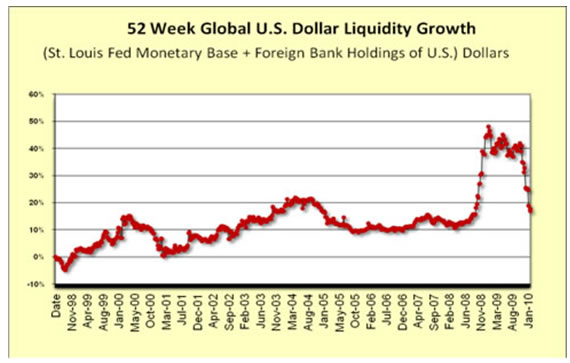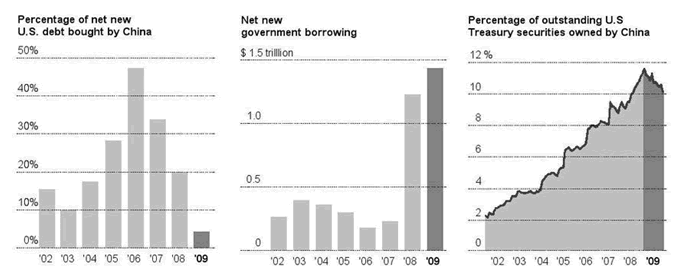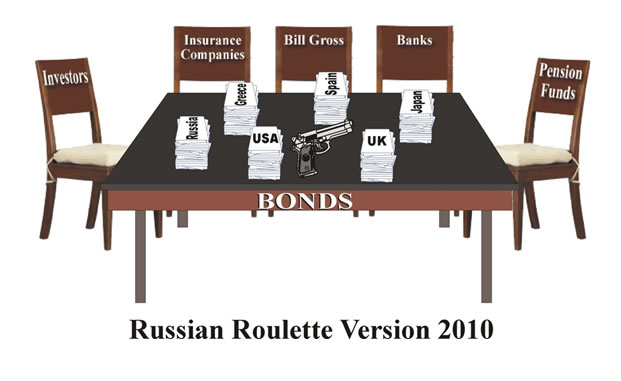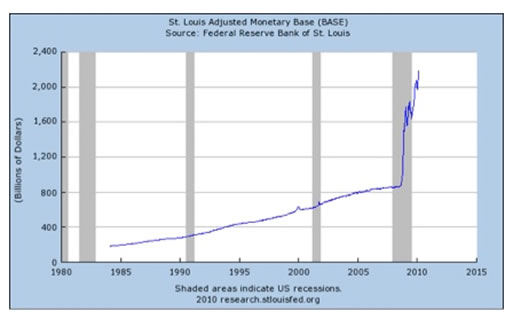U.S. Credit Turns to Debt, Will The U.S. Devalue The Dollar?
Currencies / US Dollar Mar 03, 2010 - 01:29 AM GMTBy: Darryl_R_Schoon
 The ability to wage war on credit gave the West an insurmountable advantage over the East. The West’s credit, however, has now turned to debt and the West has lost its advantage. But the return to parity will not be easy.
The ability to wage war on credit gave the West an insurmountable advantage over the East. The West’s credit, however, has now turned to debt and the West has lost its advantage. But the return to parity will not be easy.
The three hundred year economic expansion fueled by debt-based capital markets is coming to an end and with it, the hegemony of the West over the East. During that period, debt-based paper money propelled first England then the US to world dominion because of the ability to wage war on credit and to print money ad infinitum.
That era is now ending because the critical balance between credit-driven expansion and debt-driven contraction has now shifted significantly in favor of the latter; and in 2010, both East and West now find themselves on the edge of a growing deflationary sinkhole created by the sequential collapse of two large US bubbles, the dot.com and US real estate bubbles.
The US caused the 1930s deflationary depression and is again cause of the current contraction; and although similarities exist between the two, the differences between them insure a far more consequential outcome today than in the 1930s.
Global demand is again falling as credit contracts, a sign that debt-driven deflation is back but, today, there is an additional danger as well. Since 1971, because of the US default on its gold obligations, money no longer possesses intrinsic value and the consequences will soon become apparent. Deflationary depressions and a collapse in the value of fiat money have happened before but never simultaneously. Soon, they will.
We are in what Stephen Roach, Chairman of Morgan Stanley Asia, calls the end-game, the resolution of past monetary excesses and imbalances, excesses and imbalances that reached never-before-seen heights in the last decade. The long awaited day of reckoning has arrived.
THE PROBLEM
Capitalism cannot function unless its constantly compounding debt is serviced and/or paid down. Today, the US, the world’s largest debtor, can no longer pay what it owes except by rolling its debt forward and borrowing more, what the late economist Hyman Minsky called ponzi-financing, financing common in the final stages of mature capital systems.
The amount of outstanding US debt has now reached levels that can never be paid off:
… the United States government and its agencies have, by far, the largest pile-up of interest-bearing debts ($15.6 trillion), the largest accumulation of unsecured obligations (over $60 trillion), the largest yearly deficit ($1.6 trillion), and the greatest indebtedness to the rest of the world ($4.8 trillion). Martin D. Weiss, www.moneyandmarkets.com
The unpayable levels of US debt are not just the problem of the US. Because the US dollar is the lynchpin of today’s fiat money system, US debt is everyone’s problem. The US dollar is the world reserve currency and a default by the US will have far-reaching consequences, especially in China, its largest creditor.
INFLATE, DEVALUE AND TAX
Bill Gross, co-founder of PIMCO, the world’s largest bond fund and an expert in matters of debt, wrote in 2006, the way a reserve currency nation [such as the US] gets out from under the burden of excessive liabilities is to inflate, devalue, and tax.
Inflation destroys the value/cost of liabilities by eroding the value of money. Debts are paid back with inflated currencies, a process which benefits the debtor and injures the creditor. This is why reserve currency nations usually inflate their way out of debt by printing what they owe.
Devaluation is another option afforded reserve currency nations. By devaluing the value of their currency, the value of what they owe falls relative to other currencies. Again, the benefit is to the debtor at the expense of the creditor.
Taxation is another option but is no longer available to the US, as its liabilities are now too high. It would be like forcing the elderly and morbidly obese to engage in strenuous exercise to regain youth. Of the three, inflating away debt is by far the preferred option but it is one the US can no longer choose.
Managing Director and Chief US Economist at Morgan Stanley, Richard Berner, recently discussed the reasons in We Can’t Inflate Our Way Out, February 24, 2010. http://www.morganstanley.com/..
It's tempting to think that the US can inflate its way out of its fiscal problems. A faster, sustained increase in prices would erode the real value of past debt, and higher future inflation would - other things equal - reduce the real resources needed to service and pay back the promises we are making today.
However, inflating away US debt won’t work because as Richard Berner points out nearly half of federal outlays are [now] linked to inflation, meaning that increments to debt would [also] rise with inflation.
Inducing monetary inflation would also raise aggregate US debt resulting in a self-defeating cycle of higher prices and higher debt. However, there is also another more fundamental reason why inflating away US debt won’t work, to wit: Inflation is almost impossible to induce during severe deflationary contractions.
Fed Chairman Ben Bernanke understands this difficulty quite well. Bernanke’s late mentor, Milton Friedman, theorized the Great Depression could have been prevented by sufficient monetary stimulus and so in 2008, faced with the possibility of another deflationary depression, Bernanke put Friedman’s theory to the test. It failed.

http://jutiagroup.com/..
Unfortunately, when tested, Friedman’s theory didn’t work. Despite Bernanke’s massive monetary expansion, global credit is still contracting and lending is drying up.
Inflating away debt is virtually impossible in the presence of deflation, but if US monetary expansion is sufficiently large, it could result in the hyperinflation of the US money supply, which would destroy both US debt and the US economy as well.
DEVALUING THE US DOLLAR
Devaluation is the US’ only remaining option. But, on February 25th, Comstock Partners’ special report, The Cycle of Deflation, Impediments to Debt Relief, pointed out the major impediment to a US devaluation to reduce debt—China
…there is a stumbling block to the normal competitive devaluations that typically take place. In the past, a country that incurred too much debt just did what they could to devalue their currency in order to export their way out of the dilemma by exporting their goods and services to their trading partners. ..[But]The Chinese have linked their currency to ours, so as we debase our currency, one of our major trading partner's currency is also declining and China becomes the major beneficiary of the debasement of our dollar.
http://www.comstockfunds.com
The China peg to the US dollar thus prevents the US from altering its trade deficit by currency devaluation, but it does not prevent the US from devaluing the dollar for other reasons. If the US does devalue the dollar, it will not be to reduce debt—it will be to maintain its advantage over the world in general and China in particular.
YESTERDAY JAPAN TODAY CHINA
In 1985, when Japan was challenging the US for economic dominance the Japanese economy was in danger of overheating and Japan signaled the US its intent to raise interest rates.
The US responded by threatening Japan with trade sanctions, cutting off Japan from US markets. During the 1980s, the US badly needed Japanese savings to fuel Reagan’s multi-trillion dollar debt-based military buildup; and if Japanese rates were raised, Japanese savings would stay at home.
Threats of US trade sanctions forced Japan to keep interest rates low but at a perhaps fatal cost to Japan. Low interest rates combined with inflows of burgeoning trade profits ignited a speculative frenzy in stocks causing the then largest stock market bubble in history; and when the bubble collapsed in 1990, Japan fell into a deflationary trap from which it has never fully emerged.
Today, US dominance is again being challenged, this time by China. While it is not possible to know what the US will do, it is naïve to believe the US will do nothing; but whatever happens, US debt and the US dollar will be affected.
China has now significantly reduced its buying of US debt leaving the US with growing deficits and a virtual boycott by China of new US IOUs. This will impact future US/China relations.
The tentative but mutual benefits of the past are being replaced by self-interest as US spending and consequent debt is increasingly perceived as being out of control by China. That perception is correct. Since the 1980s, America’s focus has been on borrowing more, not spending less and the implications are clear.

U.S. government borrowing, percentage of outstanding U.S. Treasuries owned by China (2002-2009) – Sources: US Treasury, Haver Analytics, New York Times
With China moving away from increasingly risky US debt, the US is now far more likely to treat China as a challenger than as a needed creditor; and, while devaluing the US dollar would have minimal impact on overall US debt, it would have a significant impact on China.
In December 2009, total foreign holdings of US government debt equaled $3.29 trillion. With total US obligations now close to $100 trillion, a 30 % devaluation of the US dollar would impact only that debt held by foreigners—but the losses to China would significant
China currently owns at least $1.7 billion in US dollar denominated securities; and, if the US devalued the dollar by 30 %, China’s losses on its investments would be in excess of $500 million.
As stated earlier, it is not possible to know what the US will do. But since WWII geopolitical considerations have always outweighed economic factors in US policy decisions and there is little reason to expect this to change—even as the end-game approaches.
THE END GAME AND SOVEREIGN DEFAULT
The US is trapped. Caught between rising expenditures and the need to borrow more, outstanding US debt is incapable of ever being repaid and should the credit rating of the US ever reflect its actual state, sovereign default, not devaluation would be the result.
In 2008, Kenneth Rogoff and Carmen Reinhart in This Time Is Different: A Panoramic View of Eight Centuries of Financial Crisis reviewed the history of sovereign defaults concluding the then dearth of defaults was in actuality a warning of more to come. They were right.
Then, Rogoff and Reinhart mistakenly described the US as a “default virgin”, belonging to a small group of nations that had never defaulted. But on February 26th Rogoff said that the US had, in fact, defaulted during the Great Depression by changing the price of gold from $20 to $35 per ounce.
While technically a default, the US action was actually a currency devaluation. The real default occurred in 1973 when the US officially reneged on its gold obligations under Bretton-Woods, leaving other nations holding US paper dollars that could no longer be converted to gold.
Professor Antal Fekete noted the significance of that default when he wrote in 2008,
Thirty-five years ago gold, symbol of permanence, was chased out from the Monetary Garden of Eden, replaced by the floating irredeemable dollar as the pillar of the international monetary system. That’s right: a floating pillar. The gold demonetization exercise was a farce. It was designed as a fig leaf to cover up the ugly default of the U.S. government on its gold-redeemable sight obligations to foreigners. The word ‘default’ itself was put under taboo even though it punctured big holes in the balance sheet of every central bank of the world, as its dollar-denominated assets sank in value in terms of anything but the dollar itself.
As the end-game progresses it is impossible to know what the US will do. It is likely the US doesn’t know itself. What the US does know is that it is now trapped by increasing levels of mounting debt from which there is no easy exit.
NO EXIT
What if – to put it simply – you couldn’t get out of a debt crisis by creating more debt?
Bill Gross, PIMCO, March 2010

The question, What if you couldn’t get out of a debt crisis by creating more debt? will, in fact, be answered in some way by Mr. Gross himself. As Managing Director of PIMCO, the world’s largest bond fund, Mr. Gross is in the business of buying debt and betting on the outcome, an avocation that increasingly resembles Russian roulette.
Spreads on sovereign debt are rising and credit default swaps reflect the higher premiums being charged to protect against default. Investors such as Mr. Gross compare risk to reward in regards to debt and when the reward is believed to compensate for the risk, the bond is bought and the bet is placed.
As we enter the end-game, the odds, as in Russian roulette, exponentially increase making previous yield curves irrelevant. The trigger event may be Greece, Spain, the UK, the US, Latvia, Japan or some other nation. But, one thing is certain, when someone takes a bullet, all bets will be off. No one can cover what can’t be covered.
THE END GAME AND HUNGARY
Professor Antal E. Fekete grew up in Hungary during the most virulent period of hyperinflation in the world. Perhaps the experience made the good professor more sensitive than most about the possibility of its reoccurrence in America but he is not alone in believing so.
The possibility of a US hyperinflation was raised by Professor Laurance Kotlikoff in the July/August 2006 Review, published by the St. Louis Federal Reserve Bank: …The United States has experienced high rates of inflation in the past and appears to be running the same type of fiscal policies that engendered hyperinflations in 20 countries over the past century.
Since Professor Kotlikoff wrote those words, US monetary expansion has far exceeded what preceded it; and, what follows may be more predictable than we want to know.

From March 25-29, in Szombathely, Hungary, Professor Fekete will present a seminar on the unfolding financial crisis. Mr. Sandeep Jaitly, along with Professor Fekete will discuss how the basis can be used to predict movements in the price of gold and silver.
Mr. Jaitly is the publisher of The ‘Gold Basis Service’ a monthly subscription newsletter that describes movements in the basis and co-basis along with predictions for the coming month for gold and silver, proceeds will benefit the Gold Standard Institute. For details, see http://bullionbasis.com/..
I will also be in attendance and will speak on capitalism’s journey to the East and its mixed reception. The end-game is in progress and I have found few more knowledgeable about its origins and progress than Professor Fekete.
To enroll, contact GSUL@t-online.hu. Those who attend will receive a complementary 6 month subscription to Moving Through The Maelstrom with my monthly commentary and daily news updates, see http://www.drschoon.com/members/join/view_membership_options.asp.
I have always believed the financial crisis to be part of a far greater shift involving more than money and power, although both will be affected. Yin and yang, the universal polarities, are rebalancing.
The return to parity will not be easy.
Buy gold, buy silver, have faith.
By Darryl Robert Schoon
www.survivethecrisis.com
www.drschoon.com
blog www.posdev.net
About Darryl Robert Schoon
In college, I majored in political science with a focus on East Asia (B.A. University of California at Davis, 1966). My in-depth study of economics did not occur until much later.
In the 1990s, I became curious about the Great Depression and in the course of my study, I realized that most of my preconceptions about money and the economy were just that - preconceptions. I, like most others, did not really understand the nature of money and the economy. Now, I have some insights and answers about these critical matters.
In October 2005, Marshall Thurber, a close friend from law school convened The Positive Deviant Network (the PDN), a group of individuals whom Marshall believed to be "out-of-the-box" thinkers and I was asked to join. The PDN became a major catalyst in my writings on economic issues.
When I discovered others in the PDN shared my concerns about the US economy, I began writing down my thoughts. In March 2007 I presented my findings to the Positive Deviant Network in the form of an in-depth 148- page analysis, " How to Survive the Crisis and Prosper In The Process. "
The reception to my presentation, though controversial, generated a significant amount of interest; and in May 2007, "How To Survive The Crisis And Prosper In The Process" was made available at www.survivethecrisis.com and I began writing articles on economic issues.
The interest in the book and my writings has been gratifying. During its first two months, www.survivethecrisis.com was accessed by over 10,000 viewers from 93 countries. Clearly, we had struck a chord and www.drschoon.com , has been created to address this interest.
Darryl R Schoon Archive |
© 2005-2022 http://www.MarketOracle.co.uk - The Market Oracle is a FREE Daily Financial Markets Analysis & Forecasting online publication.



